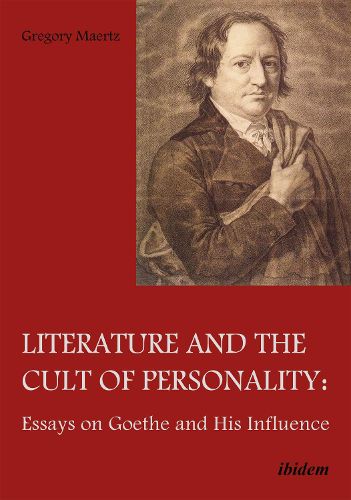Readings Newsletter
Become a Readings Member to make your shopping experience even easier.
Sign in or sign up for free!
You’re not far away from qualifying for FREE standard shipping within Australia
You’ve qualified for FREE standard shipping within Australia
The cart is loading…






This title is printed to order. This book may have been self-published. If so, we cannot guarantee the quality of the content. In the main most books will have gone through the editing process however some may not. We therefore suggest that you be aware of this before ordering this book. If in doubt check either the author or publisher’s details as we are unable to accept any returns unless they are faulty. Please contact us if you have any questions.
The construction of Johann Wolfgang von Goethe as an Anglo-American sage and literary icon was the product of a cult of personality that lay at the centre of nineteenth-century cultural politics. A reconstruction of the culture wars fought over Goethes authority, a previously hidden chapter in the intellectual history of the period ranging from the late eighteenth century to the threshold of Modernism, is the focus of this book. Marginal as well as canonical writers and critics figured prominently in this process, and this book offers insight into the mediation activities of Mary Wollstonecraft, Henry Crabb Robinson, the canonical Romantic poets, Thomas Carlyle, Margaret Fuller, George Eliot, Matthew Arnold, and others. For women writers and Jacobins, Scots, and Americans, translating Goethe served as an empowering cultural platform that challenges the myth of the self-sufficiency of British literature. Reviewing and translating German authors provided a means of gaining literary enfranchisement and offered a paradigm of literary development according to which ‘re-writers’ become original writers through an apprenticeship of translation and reviewing. In the diverse and fascinating body of critical writing examined in this book, textual exegesis plays an unexpectedly minor role; in its place, a full-blown cult of personality emerges along with a blueprint for the ideology of hero-worship that is more fully mapped out in the cultural and political life of twentieth-century Europe.
$9.00 standard shipping within Australia
FREE standard shipping within Australia for orders over $100.00
Express & International shipping calculated at checkout
This title is printed to order. This book may have been self-published. If so, we cannot guarantee the quality of the content. In the main most books will have gone through the editing process however some may not. We therefore suggest that you be aware of this before ordering this book. If in doubt check either the author or publisher’s details as we are unable to accept any returns unless they are faulty. Please contact us if you have any questions.
The construction of Johann Wolfgang von Goethe as an Anglo-American sage and literary icon was the product of a cult of personality that lay at the centre of nineteenth-century cultural politics. A reconstruction of the culture wars fought over Goethes authority, a previously hidden chapter in the intellectual history of the period ranging from the late eighteenth century to the threshold of Modernism, is the focus of this book. Marginal as well as canonical writers and critics figured prominently in this process, and this book offers insight into the mediation activities of Mary Wollstonecraft, Henry Crabb Robinson, the canonical Romantic poets, Thomas Carlyle, Margaret Fuller, George Eliot, Matthew Arnold, and others. For women writers and Jacobins, Scots, and Americans, translating Goethe served as an empowering cultural platform that challenges the myth of the self-sufficiency of British literature. Reviewing and translating German authors provided a means of gaining literary enfranchisement and offered a paradigm of literary development according to which ‘re-writers’ become original writers through an apprenticeship of translation and reviewing. In the diverse and fascinating body of critical writing examined in this book, textual exegesis plays an unexpectedly minor role; in its place, a full-blown cult of personality emerges along with a blueprint for the ideology of hero-worship that is more fully mapped out in the cultural and political life of twentieth-century Europe.